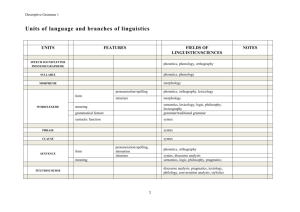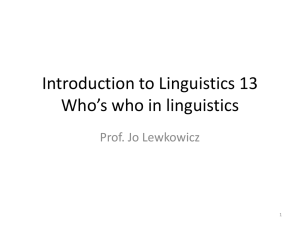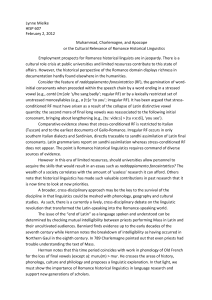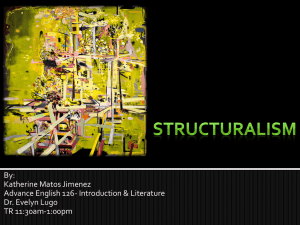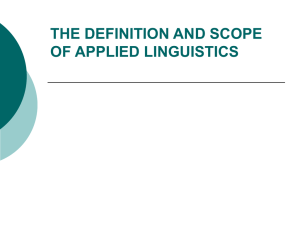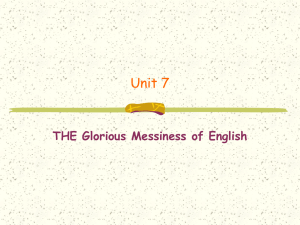Chyba! V dokumentu není žádný text v zadaném stylu.
advertisement
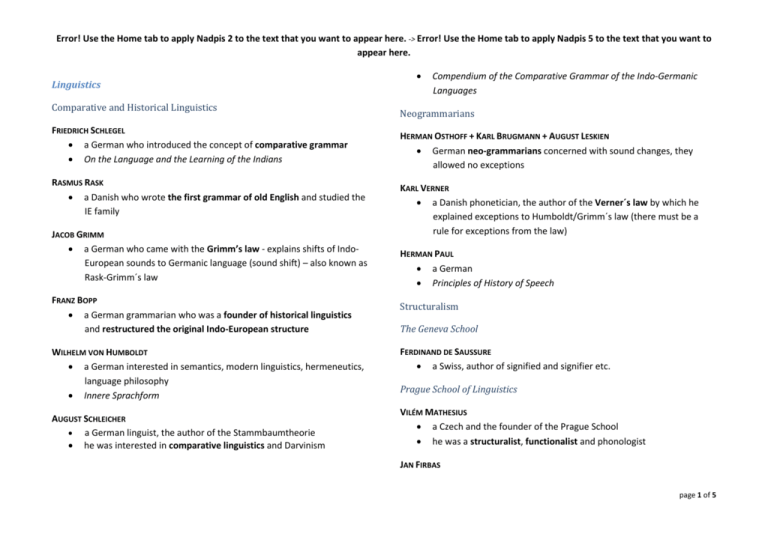
Error! Use the Home tab to apply Nadpis 2 to the text that you want to appear here. -> Error! Use the Home tab to apply Nadpis 5 to the text that you want to appear here. Linguistics Comparative and Historical Linguistics FRIEDRICH SCHLEGEL a German who introduced the concept of comparative grammar On the Language and the Learning of the Indians RASMUS RASK a Danish who wrote the first grammar of old English and studied the IE family JACOB GRIMM a German who came with the Grimm’s law - explains shifts of IndoEuropean sounds to Germanic language (sound shift) – also known as Rask-Grimm´s law Compendium of the Comparative Grammar of the Indo-Germanic Languages Neogrammarians HERMAN OSTHOFF + KARL BRUGMANN + AUGUST LESKIEN German neo-grammarians concerned with sound changes, they allowed no exceptions KARL VERNER a Danish phonetician, the author of the Verner´s law by which he explained exceptions to Humboldt/Grimm´s law (there must be a rule for exceptions from the law) HERMAN PAUL a German Principles of History of Speech FRANZ BOPP a German grammarian who was a founder of historical linguistics and restructured the original Indo-European structure Structuralism WILHELM VON HUMBOLDT a German interested in semantics, modern linguistics, hermeneutics, language philosophy Innere Sprachform FERDINAND DE SAUSSURE a Swiss, author of signified and signifier etc. AUGUST SCHLEICHER a German linguist, the author of the Stammbaumtheorie he was interested in comparative linguistics and Darvinism The Geneva School Prague School of Linguistics VILÉM MATHESIUS a Czech and the founder of the Prague School he was a structuralist, functionalist and phonologist JAN FIRBAS page 1 of 5 Error! Use the Home tab to apply Nadpis 2 to the text that you want to appear here. -> Error! Use the Home tab to apply Nadpis 5 to the text that you want to appear here. NIKOLAI TRUBECKOI a Russian with contributions to phonology and phonetics, founded morphology Grundzüge der Phonologie (Principles of Phonology) BOHUSLAV HAVRÁNEK a Czech interested in language registers, dialects, he paid attention to what the utterance is JAN MUKAŘOVSKÝ a Czech interested in didactics (textbooks, dictionaries), he was preserving purism BOHUSLAV TRNKA Great Vowel Shift in Middle English JOSEF VACHEK a Czech interested in the attitude to spoken and written language, he came with the functional approach, claiming that language has two norms, which have different functions (written for preservation, which is clear and easy to understand and spoken, which is dynamic ROMAN JAKOBSON a Russian linguist interested in structural analysis of language (applied to other ling. branches – syntax, morphology) he started the discipline of phonology On the structure of Russian verbs The Copenhagen School of Structuralism LOUIS HJELMSLEV a Danish interested in phonology (Plane of expression), semantics (Plane of content), comparative linguistics, semiotics and the founder of glossematics RASMUS RASK American Structuralism and Descriptivism FRANZ BOAS a German-American who was interested in descriptive studies of Native American languages, anthropological linguistics EDWARD SAPIR a German-American interested in sociolinguistics (link between culture and language), anthropological linguistics (what role the language plays in the rituals of the native Indians) and synchronic studies of languages LEONARD BLOOMFIELD an American who was interested in phonetics and phonology = Bloomfieldian era (he saw no sense in studying syntax or semantics) Language – a key book for American linguistics BENJAMIN LEE WHORF an American linguist, descriptivist, interested in how the structure of a language affects the perception of the world (Hopi) page 2 of 5 Error! Use the Home tab to apply Nadpis 2 to the text that you want to appear here. -> Error! Use the Home tab to apply Nadpis 5 to the text that you want to appear here. author of the (Sapir-)Whorf hypothesis CLAUDE LEVY STRAUSS a French interested in ethnology and grammar, he also applied Saussure’s the structural linguistics to anthropology Formalist School (generative) NOAM CHOMSKY an American, who still unfortunately is interested in syntax, semantics, transformational and generative grammar Syntactic structures British Structuralism J. R. FIRTH prosody Neo-Firthian linguistics/scale and category grammar/systemic grammar/linguistics M.A.K. HALLIDAY professor of general linguistics An Introduction to a Functional Grammar BRONISLAW MALINOWSKI a Polish interested in context of situation from anthropology to linguistics and structural linguistics Sociolingustics RICHARD HUDSON a British who claims that creoles are languages just like all others CHARLES ALBERT FERGUSON JOHN LYONS British WILLIAM LABOV an American interested in sociolinguistics, dialectology and language change DELL HATHAWAY HYMES American DWIGHT BOLLINGER an American interested in semantics, intonation and phonesthesia (sound symbolism) JOHN J. GUMPERZ an American interested in code-switching, discourse analysis, linguistic anthropology and urban antropology LESLEY MILROY a British sociolinguist interested in rural and urban dialectology, language ideology, language standardization JENNY CHESHIRE a British interested in sociolinguist, language variation and change (esp. grammatical and discourse variation) and spoken English syntax PETER TRUDGILL page 3 of 5 Error! Use the Home tab to apply Nadpis 2 to the text that you want to appear here. -> Error! Use the Home tab to apply Nadpis 5 to the text that you want to appear here. a British interested in sociolinguist and dialectology LAMBERT AND TUCKER JOHN L. FISHER BATES AND BENIGNI VINCENT MACAULAY a Scottish BROWN AND FORD FAND AND HENG GILLIAN SANKOFF from Montreal Phonetics and Phonology HENRIETTE CEDERGREN JOHN PALSGRAVE lived in 16th century and wrote a book on French grammar WALT WOLFRAM an American CHARLES JAMES BAILEY BICKERTON JOSHUA FISHERMAN an American JOHN L. AUSTIN a British interested in speech acts JOHN SEARLE an American also interested in speech acts FRAKE BURLING BROWN AND GILMAN WILLIAM SALESBURY he made Dictionary of Eng. and Scot. and described English sounds JOHN HART, ALEXANDER GIL both British living in the 16th century and dealt with increasing inconsistency in relation English - Latin sounds JOHN WALLIS a British who lived in the 17th century Grammatica linguae anglicanae (history of English, description of the organs of speech, classification of vowels and consonants) JOHN WILKINS a British, wrote Essay towards a real character and a philosophical language (Creates system of marks for expressing sounds) CHRISTOPHER COOPER a British who wrote Grammatica linguae anglicanae (pronunciation for ordinary people, deals with contemporal English) page 4 of 5 Error! Use the Home tab to apply Nadpis 2 to the text that you want to appear here. -> Error! Use the Home tab to apply Nadpis 5 to the text that you want to appear here. JOHN WALKER Dictionary of national biography - influential orthoepic work, analyses of intonation JOSHUA STEELE Prosodia rationalis (system of notation capable of expressing pitch changes, stress and rate of delivery) ISAAC PITMAN a British who created a system of shorthands (kind of transcription) which is still used ALEXANDER ELLIS a British who created an alphabet called Phonotype (based on phonetic analysis, based upon Latin characters), Developed other alphabets as well: Glossic, Palaeotype HENRY SWEET a British, wrote Transcriptions Broad and Narrow romic, inspiration for a character of Mr. Higgins in Shaw’s Pigmallion ALEXANDER M. BELL a Scottish-American interested in visible speech (classification of all sounds that can be produced by human organs of speech; later helped learning Eng. to the deaf) GEOFFREY LEECH a British interested in grammar, semantics (context and sound), stylistics, pragmatics,... HAROLD DWIGHT LASSWELL an American politician and linguist, author of the formula – model of communication KARL BÜHLER a German linguist, the author of functions of communication DANIEL JONES a British phonetician who founded RP Everyman's English Pronouncing Dictionary MORRIS HALLE Latvian-American ALFRED C. GIMSON updated and extended Jones’s description of standard British English pronunciation JOHN CHRISTOPHER WELLS he still unfortunately is a British phonetician and Esperanto teacher and a professor emeritus at University College London wrote the first (1990) Longman’s dictionary ALAN CRUTTENDEN Emeritus Professor of Phonetics, University of Manchester; Fellow of the Phonetics Laboratory, University of Oxford interested in comparative intonation, child language and phonetics of English page 5 of 5
